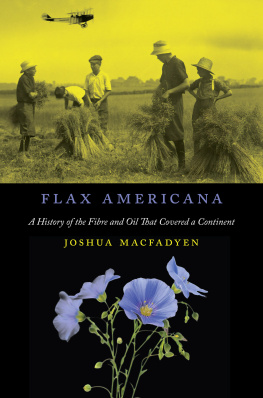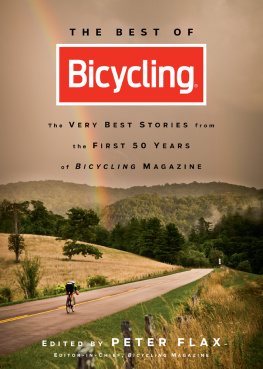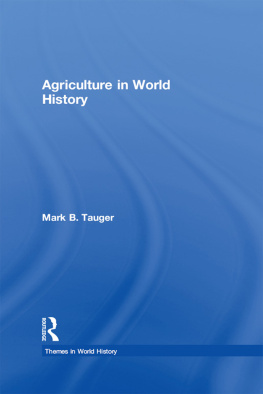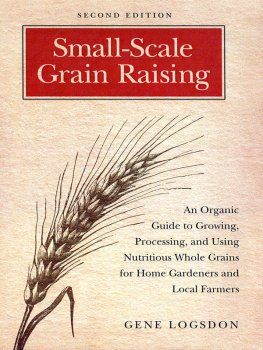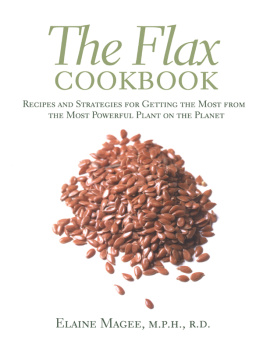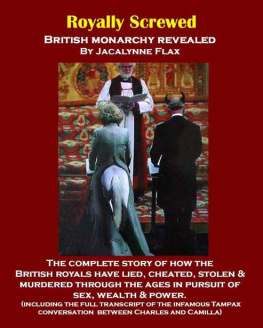
FLAX AMERICANA
MCGILL-QUEENS RURAL, WILDLAND, AND RESOURCE STUDIES SERIES
Series editors: Colin A.M. Duncan, James Murton, and R.W. Sandwell
The Rural, Wildland, and Resource Studies Series includes monographs, thematically unified edited collections, and rare out-of-print classics. It is inspired by Canadian Papers in Rural History, Donald H. Akensons influential occasional papers series, and seeks to catalyze reconsideration of communities and places lying beyond city limits, outside centres of urban political and cultural power, and located at past and present sites of resource procurement and environmental change. Scholarly and popular interest in the environment, climate change, food, and a seemingly deepening divide between city and country, is drawing non-urban places back into the mainstream. The series seeks to present the best environmentally contextualized research on topics such as agriculture, cottage living, fishing, the gathering of wild foods, mining, power generation, and rural commerce, within and beyond Canadas borders.
1 How Agriculture Made Canada Farming in the Nineteenth Century
Peter A. Russell
2 The Once and Future Great Lakes Country An Ecological History
John L. Riley
3 Consumers in the Bush Shopping in Rural Upper Canada
Douglas McCalla
4 Subsistence under Capitalism Nature and Economy in Historical and Contemporary Perspectives
Edited by James Murton, Dean Bavington, and Carly Dokis
5 Time and a Place An Environmental History of Prince Edward Island
Edited by Edward MacDonald, Joshua MacFadyen, and Iren Novaczek
6 Powering Up Canada A History of Power, Fuel, and Energy from 1600
Edited by R.W. Sandwell
7 Permanent Weekend Nature, Leisure, and Rural Gentrification
John Michels
8 Nature, Place, and Story Rethinking Historic Sites in Canada
Claire Elizabeth Campbell
9 The Subjugation of Canadian Wildlife Failures of Principle and Policy
Max Foran
10 Flax Americana A History of the Fibre and Oil That Covered a Continent
Joshua MacFadyen
FLAX AMERICANA
A History of the Fibre and Oil That Covered a Continent
JOSHUA MACFADYEN
McGill-Queens University Press
Montreal & Kingston London Chicago

McGill-Queens University Press 2018
ISBN 978-0-7735-5346-0 (cloth)
ISBN 978-0-7735-5347-7 (paper)
ISBN 978-0-7735-5395-8 (ePDF)
ISBN 978-0-7735-5396-5 (ePUB)
Legal deposit third quarter 2018
Bibliothque nationale du Qubec
Printed in Canada on acid-free paper that is 100% ancient forest free (100% post-consumer recycled), processed chlorine free
This book has been published with the help of a grant from the Canadian Federation for the Humanities and Social Sciences, through the Awards to Scholarly Publications Program, using funds provided by the Social Sciences and Humanities Research Council of Canada. Funding has also been received from Arizona State University.

We acknowledge the support of the Canada Council for the Arts, which last year invested $153 million to bring the arts to Canadians throughout the country.
Nous remercions le Conseil des arts du Canada de son soutien. Lan dernier, le Conseil a investi 153 millions de dollars pour mettre de lart dans la vie des Canadiennes et des Canadiens de tout le pays.
LIBRARY AND ARCHIVES CANADA CATALOGUING IN PUBLICATION
MacFadyen, Joshua, 1979, author
Flax Americana : a history of the fibre and oil that covered a continent / Joshua MacFadyen.
(McGill-Queens rural, wildland, and resource studies series ; 10)
Includes bibliographical references and index.
Issued in print and electronic formats.
ISBN 978-0-7735-5346-0 (cloth). ISBN 978-0-7735-5347-7 (paper). ISBN 978-0-7735-5395-8 (ePDF). ISBN 978-0-7735-5396-5 (ePUB)
1. Flax industry Canada History. 2. Flax industry United States History. 3. Linen industry Canada History. 4. Linen industry United States History. 5. Linseed oil industry Canada History. 6. Linseed oil industry United States History.
I. Title. II. Series: McGill-Queens rural, wildland, and resource studies series ; 10
HD9930.C32M33 2018 | 338.47677110971 | C2018-902236-1 |
C2018-902237-X |
Set in 11/14 Adobe Caslon Pro
Book design & typesetting by Garet Markvoort, zijn digital
CONTENTS
CHAPTER ONE
The Edge of Industrialization:
Finding a Northern Fibre
CHAPTER TWO
Everyday Exchanges:
Growing and Harvesting Flax in Ontario
CHAPTER THREE
Flax Fabrications:
Selling the Promoters Plant
CHAPTER FOUR
Covering the Earth:
North American Flax and Paint to 1878
CHAPTER FIVE
Saving the Surface:
Flax in the Urban Industrial Complex
CHAPTER SIX
Cover Crop:
Growing Flax for Linseed Oil and Paint
CHAPTER SEVEN
Saving Flax:
Industry, Science, and the Tariff
TABLES AND FIGURES
Tables
Figures
ACKNOWLEDGMENTS
This book is long, and it took a long time to finish. It seems appropriate, therefore, to parrot Charles Darwin, who in 1879 wrote to his friend Asa Gray: I have written a rather big book more is the pity on the movements of plants, and I am now just beginning to go over the MS for the second time, which is a horrid bore. Dont get me wrong, mapping the movement of the flax plant, from Ireland to Ontario and from Alberta to Argentina, has been a fun and fascinating way to explore the people and places at the edges of industrial capitalism. The real trouble of taking so long to finish a project is that I have lived in six cities, nine addresses, and four treaties or traditional territories since starting it, and I have accumulated too many intellectual debts and personal friendships at each one to properly acknowledge here. So, I will proceed, improperly, and say too little about too few of my friends and colleagues.
The idea for Flax Americana germinated while I was taking courses in social history at the University of Guelph and working with Dr Douglas McCalla, the Canada Research Chair in Rural History. Other important advisors there included Drs Catharine Wilson, Kris Inwood, Stuart McCook, Richard Reid, Kevin James, and Terry Crowley at Guelph; Suzanne Zeller and Terry Copp at Wilfrid Laurier University; and James Walker, Wendy Mitchinson, Geoffrey Hayes, and Stanley Johannesen at the University of Waterloo. Dr Sterling Evans provided valuable feedback on the first complete draft as external examiner, and he has supported the project ever since. Earlier encouragement and advice came from professors such as Elwood Jones, at Trent University, and Edward MacDonald and Sasha Mullally at the University of Prince Edward Island.
I have gained critical research support from many sources, including the Canada Research Chair in Rural History and the Snell-Murray Ontario Graduate Scholarship at the University of Guelph; a SSHRC Postdoctoral Fellowship and support from the NiCHE: Network in Canadian History & Environment Strategic Knowledge Cluster at the University of Western Ontario; and the Sustainable Farm Systems SSHRC Partnership Grant at the University of Saskatchewan. Finally, I am grateful for subventions from the Awards to Scholarly Publications Program at the Federation for the Humanities and Social Sciences, and the Institute for Humanities Research at Arizona State University, as well as support from both of my units there. The faculty and staff at the School of Historical, Philosophical, and Religious Studies and the School of Sustainability have been inspirational colleagues, sharpening both my pedagogy and research.
Next page
